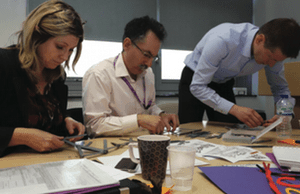Major Transformation in Project Delivery at Network Rail In the wake of the independent 2011 McNulty report, which recommended how the rail industry could deliver a safe and efficient railway that represented value-for-money for both fare payers and taxpayers, a transformation has been taking place at Network Rail. As part of a range of reforms to encourage competition and reduce costs, Network Rail has created a separate, customer focussed project delivery business – Infrastructure Projects – and is taking a new approach to defining projects, with earlier involvement of suppliers in the project’s lifecycle, stronger project control and more transparency.
Fundamental changes have been underway at Network Rail, the owner of Britain’s rail tracks and stations, under the leadership of Sir David Higgins, former chief executive of the Olympic Delivery Authority, who took up the post of chief executive at Network Rail in early 2011. The organisation had come under pressure to reduce costs as a result of the 2011 McNulty Report on rail industry spending, which recommended how the rail industry could deliver a safe and efficient railway that represented value-for-money for both fare payers and taxpayers. These changes are making Network Rail more efficient and more customer-focussed, and also helping to deliver a higher performing, sustainable railway system. The McNulty Report also recommended a closer working relationship between Network Rail and the train operators and devolution of responsibility so that decisions are made as close to customers and the market as possible.
A Culture of Transparency
In a major cultural change there is now increased visibility and transparency within the organisation with information being shared more freely. For example the CEO Report is accessible to all employees where it was previously accessible only to the Board and Senior Executives. Naturally there are some commercial limitations on the sharing of information, but where there are no restrictions, this culture of sharing information is also encompassing the public. Key pieces of information are readily available via the Network Rail website in a way that was previously unthinkable.
This open and honest approach to freedom of information, whilst a daunting prospect to some, is an extremely positive move. Being able to view debates and thought processes, even if unable to influence them, allows employees and the general public to make informed decisions and exploit opportunities that they would previously have been unaware of.
A perfect example of this is how safety is managed at some high-risk level crossings; with a better informed public, they are more likely to understand the issues and community support can be enlisted to reduce these risks.
The Network Rail of today is a mature organisation, with safety an intrinsic part of everything they do; safety is built into the design of every aspect of the railways from signalling to platform heights to small components purchased from suppliers.
Devolution of Regional Routes
Prior to the McNulty Report, Higgins had already announced the devolution of decision-making at Network Rail to 10 regional routes, which are self-contained organisations with operational responsibility for their own routes and autonomy to align their operations with the passenger and freight train operators. This devolution of power, whilst still maintaining central accountability and standards, was completed at the end of 2011 and has allowed for better optimisation of routes and focus on the common goals of improved efficiency and benefits to passengers. Decisions can be made more quickly resulting in cost savings whilst maintaining quality and standards.
The 10 organisations now own their own assets and can determine how and when to manage, maintain or renew those assets. Where there still exists the need for national level projects, such as signalling and electrification schemes, these are co-ordinated and controlled at a national level to benefit from economies of scale.
Infrastructure Projects – An Independent Project Delivery Business
In parallel with the devolution of the routes there have been other fundamental changes in the way Network Rail operates internally as part of the drive to encourage competition and become more commercially focused. This resulted in the establishment of an independent project delivery business in April 2012 called Infrastructure Projects (IP), which acts as a supplier to the Network Rail client organisation. This framework draws on the approach of the Olympics Delivery Authority / CLM structure that successfully delivered the London 2012 Olympics. It creates a healthy tension between the different parts of the company and empowers employees to achieve their goals. Infrastructure Projects comprises a total of 3,500 staff including 1,000 project managers across four regionally based and four dedicated programme organisations responsible for the delivery of major renewal and enhancement works, with capabilities now covering:
- Signalling & Electrification
- Telecommunications
- Building & Civil Engineering
- Track
- Capacity Enhancement Engineering
Under this new relationship, IP is no longer guaranteed all project work – currently approximately 80% of the project portfolio is allocated by Network Rail to its Infrastructure Projects group as they are considered the most suitable supplier because of their experience and their ability to successfully manage and control the project work and add value in terms of efficiency and economies of scale. IP has the ongoing challenge to continue to add value and the group is determined to maintain the level of quality and excellence in the projects they deliver.
Network Rail undertake a huge spectrum of projects including:
- Renewal and replacement of bridges and tunnels
- Modernisation and introduction of revised signalling solutions
- Increasing the network capability to enable increased capacity
- Delivery of complex projects e.g. Kings Cross & Birmingham Gateway
- Multi-disciplined complex programmes such as Thameslink & Crossrail
- Major electrification & telecommunication schemes.
For projects that are still allocated to Infrastructure Projects, there is also an imperative to more fully understand project costs in order to accurately determine the true costs of Network Rail projects and provide a value-for-money service that can more readily be compared on a ‘like for like’ basis with other European railways.
Network Rail’s new, value and service focussed approach to projects will entail:
- Earlier involvement of suppliers so that they can have more influence over the design and development of solutions with the aim of improving efficiency.
- Improved clarity of costs through the use of a ‘services supplied’ approach which will enable clear cost accounting for the direct and indirect deliverables supplied to the client (Route) organisations.
- More transparency internally and also externally to taxpayers and to rail users to increase the understanding of costs and risks associated with major projects.
One of the first areas to benefit from this transformation is the way in which functional silos have been replaced with more efficient organisational reporting structures. Before the changes projects involved integrating staff from a number of separate functional areas to form a project team, such as:
- Project Planning
- Systems Engineering & Design
- Programme Controls
- Reporting Specialists
- Commercial Management
- Project Management
In the revised organisational solution the Project Manager is fully accountable and they have a fixed project team with the functional resources now reporting directly to them. As an organisation that manages on average 6000 projects per annum a series of dedicated project teams has been established, which are now assigned projects rather than creating a new team per project. This has led to more collaboration between the functional project team members, improved communication and more effective working.
Winning Project Work under a New Competitive Structure

The changes in the way projects are delivered at Network Rail will encourage innovation and competition and ensure projects are delivered not only safely but also more efficiently.
Project work undertaken by Infrastructure Projects in the new client/supplier arrangement will require improved processes compared to those used in the old integrated organisation and IP is still at the learning stage of this transformation. The group will have to develop a culture of consistency and collaboration between project management, planning, risk management, estimating and commercial functions. They will require new competencies and skills which have started to be developed and will continue to be developed through a major training program over the coming months and years.
BS 11000 – Collaborative Business Relationships
An example of the cultural change in progress at Network Rail is that they have already been independently assessed and gained the BS11000 certification for Collaborative Business relationships. This framework means that they can achieve maximum benefits from their working relationship between different divisions through improved communication and decision making processes, and clearly defined roles, responsibilities and reporting structures. These improvements make business relationships easier to manage because of the shared goals, costs and risks. BS11000 is one of the tools Network Rail is using to improve business relationships with its suppliers to drive down costs.
Learning and Development Opportunities
The BS11000 approach is being augmented with a range of learning opportunities and training courses, including a bespoke training course for the Infrastructure Projects group, developed by and in conjunction with Parallel Project Training called “Project Management, Planning and Control in a Competitive World”. With the significant challenges and opportunities faced by Infrastructure Projects it is essential that they can control project scope, timescales, costs and risks in a competitive environment, and this training course has been designed to help them do just that.
Alastair Forbes, Head of Programme Standards and Planning, commented on the tailored training programme:
“The training course was developed over a period of 3 – 4 months and drew on the extensive expertise of Parallel to identify areas for improvement and then target those areas with innovative, meaningful ways of delivering the training. Pilot courses were run with individuals attending who would challenge the trainer and the content to ensure the course met our needs. Those who attended the early pilots have been inspired by the training and are now great advocates of the changes taking place at Networks Rail’s Infrastructure Projects business.”

To date 20 courses have been run by Parallel Project Training since they first started the training programme in early 2012. This course is intended to support the behavioural and process changes that are required at Infrastructure Projects and is aimed at three key groups: Programme Management, Commercial, and Planning with 25% of the Infrastructure Projects group targeted to attend the course. Further e-learning is being developed to ensure that key messages are communicated to, and fully understood by, the wider group.
Many of the Network Rail project managers, whilst feeling trepidation at the scale and far-reach of the changes being undertaken as part of the establishment of the Infrastructure Projects organisation, have recognised the value of these changes and the career development opportunities that they present.
Paul Naybour Business Development Director at Parallel Project Training, remarked
“At Parallel we had the flexibility to tailor the training programme to the specific requirements of Network Rail’s Infrastructure Projects business and to rapidly update the pilot courses to incorporate feedback from participants. Using relevant, real-life material such as the HS2 project has proved to be highly successful, enabling participants to gain maximum benefit from the course and support them in the cultural and behavioural changes required for Network Rail’s new, competitive approach to projects.”
The Association for Project Management (APM) is the professional Project Management institute of choice for Network Rail, who are an APM Corporate Member which supports and underpins their commitment to professionalism in project management. The majority of Network Rail project team members have previously undertaken APM training courses ranging from APMP to Registered Project Professional (RPP) certification. For this reason, the “Project Management, Planning and Control in a Competitive World” training course was underpinned by the APM methodology.